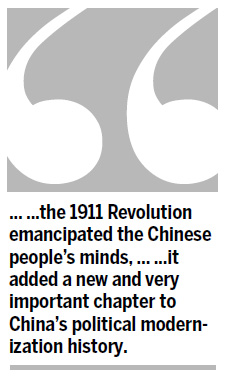Mental emancipation the greatest gift

Exactly 100 years ago, an unexpected explosion at midnight in Wuchang city, Hubei province, triggered a decisive event in China's modern history: the 1911 Revolution. In less than five months, the last emperor Aisin-gioro Pu Yi abdicated, and the Qing Dynasty (1644-1911) and the monarchy that had ruled China for more than 2,000 years were overthrown.
The end of the monarchy had a far greater impact on the people than the overthrowing of the last emperor, says Li Wenhai, a historian at Renmin University of China. In a recent article for People's Daily, Li writes: "By answering two politically decisive questions, the 1911 Revolution emancipated the Chinese people's minds," He says and stresses that it added a new and very important chapter to China's political modernization history.
The revolution's first subversive answer was to the question: where the legality of state sovereignty comes from. For more than 2,000 years, the emperor was considered a divine power sent from heaven to rule China. This rule had become "sacred and inviolable".















